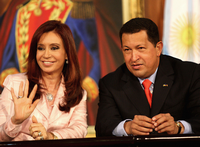Events in Honduras and Argentina last weekend raised the stakes in a historic debate unfolding in the Western Hemisphere. Latin America has become the stage for a fierce, at times violent, ideological battle about the best way to govern a poor country. The ideology and governing style at the center of the dispute is Chavismo, the creation of Venezuela's President Hugo Chávez. And in the battle over Chavismo, this past weekend marked a major milestone.
Much of the hemisphere's diplomatic and media attention has focused on the dramatic overthrow of Honduran President Manuel Zelaya last Sunday. Zelaya arrived in Costa Rica, still in his pajamas, after military forces rousted him from his bed, packed him out of the country, and replaced him with the head of the Congress. But the drama in Tegucigalpa has overshadowed the astonishing elections in Argentina. In Sunday's vote, the couple viewed by Argentineans as de facto co-presidents -- President Cristina Fernández de Kirchner and her husband, former President Néstor Kirchner -- suddenly became lame ducks, suffering a humiliating defeat in mid-term elections. The voters' verdict deals a devastating blow to the Kirchners' plans to create a political dynasty in which the two would alternate terms at the Casa Rosada, Buenos Aires' pink version of the White House.
More importantly from a regional perspective, the vote against the Kirchners scores an important victory for anti-Chávez forces in Latin America. Chávez had been a close ally of both Kirchner administrations, stoking their populist rhetoric and acting as lender of last resort. When Argentina defaulted on its international loans, it was Chávez who allowed Buenos Aires to scoff at the rules of global lenders.

